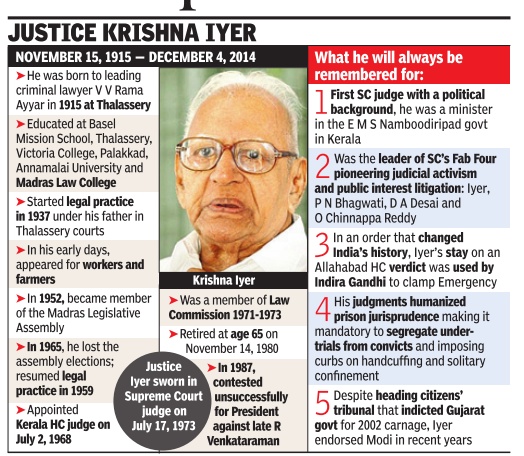V R Krishna Iyer
This is a collection of articles archived for the excellence of their content. |
Krishnaiyerisation of Indian jurisprudence
Man who rescued Supreme Court from supreme shame
By Harish Salve The Times of India Dec 05 2014
Justice V R Krishna Iyer has passed on to the other world. He scored a cen tury. He was unwell in body al though his spirit was, as always, in d o m i t a b l e.
And yet, I cannot shake off a deep sense of grief. My generation, who learned from him of what the Supreme Court was all about, considered his body -as well as his soul and his wisdom -to be immortal.
Some eminent lawyers of the generation before us had mixed feelings about the man who led the revolution in jurisprudence which helped a then-floundering Supreme Court find its identity . He challenged the status quo and thus had his share of critics and followers. The gen next has his judgments to read. For my generation, he was the architect of the Supreme Court, post Emergency . As Professor Upendra Baxi said, from the Supreme Court of India he made it the Supreme Court for Indians. He defined fundamental rights as well as charters of freedom, not just to acquire and hold wealth, but freedom from poverty and misery . He ensured that the hesitation in reading due process into Article 21 was dispelled. The foundation for a whole jurisprudence was laid by reading Article 14 as a charter against nonarbitrariness.
By refusing an outright stay on the verdict setting aside Indira Gandhi's election, he showed that however high and mighty you are, the rules of the game do not change. The bar for future judges was set very high! This was what may be called the Krishnaiyerisation of Indian jurisprudence.
He rescued the Supreme Court from the supreme shame of the Shivkant Shukla judgment (in 1976, Justices P N Bhagwati, A N Ray ,YV Chandrachud and M H Beg agreed with the then Indira Gandhi government that even the right to life stood abrogated during the Emergency in ADM Jabalpur vs Shivkant Shukla case). The verdict constitutes one of the darkest chapters in the history of the court as it struck at the very heart of fundamental rights. It was a judgment that put a question mark on the credibility of the institution. If detention even on a mistaken identity was not amenable habeas corpus, and a detenu lacked the locus to question his own detention, then we could as well wind up the Supreme Court -and the high courts as well. PostEmergency , the Krishna Iyer jurisprudence breathed new , life into what was seen as a listless institution. Supreme Court today stands tall and is ! the most powerful institution of its kind in the world and its work has shown that it is sui generis. India needs such a court even if other countries do not have or need such a court. That other similar institutions do not do what our court does did not deter Krishna Iyer from redesigning constitutional remedies to address constitutional aberrations.
Justice Iyer wrote in a style that has been the envy of not just other jurists but also students of English literature. There was a flow a natural ease -even if he used words like jejune that needed a dictionary to decode. He coined words too -and powerful ones at that.
Justice Iyer was spiritually highly evolved. He believed in the immortality of the soul. I had the privilege of conversations with him on communicating with those on the other side. I take comfort in the thought that he will, from the other side, continue to guide us as he did earlier. On a personal note, my tribute to his passing on will be to honor his beliefs I am sure he saw death as Coleridge describes it: “..Greatness and goodness are not means but ends ! Hath he not always treasures, always friends, The good great man? Three treasures, love, light, And calm thoughts, regular as infants' breath: And three firm friends, more sure than day and night, Himself, his maker and the angel death.“
The writer is former Solicitor General of India
